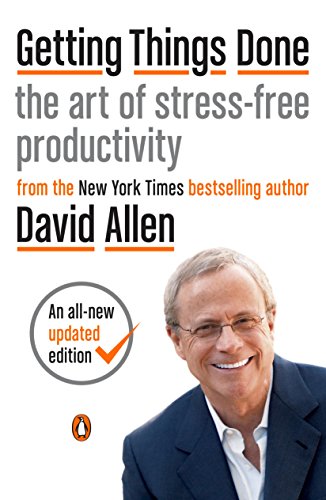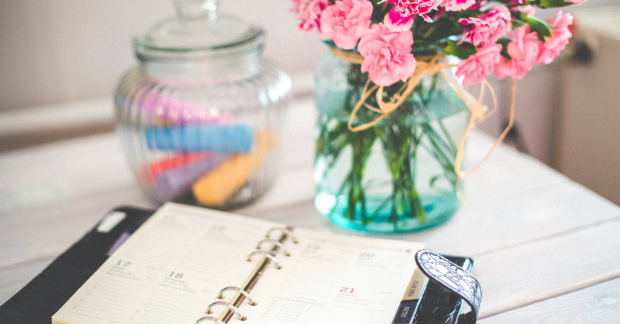Staying organized is easier said than done. Although everyone knows the wonders it can do when it comes to productivity, you will find that most people struggle with staying organized at work– especially if they’re always busy or overwhelmed.
Luckily, there are some tips and tricks that can help you boost your productivity levels by doing something as simple as staying organized.
Today, we are going to take a look at the ultimate guide to staying organized at work.

Getting things done
by David Allen
⏱ 13 minutes reading time
🎧 Audio version available
Stop Procrastinating
We’ve all been in situations where, instead of completing a task that has a deadline on the horizon, we find ourselves doing things completely unrelated to the tasks and wasting our time for absolutely no reason– and the thing is, we do it over and over again.
A popular misconception that people believe about procrastination is that it comes from a lack of willpower. But, the reality is, it’s more associated with our fear of failure and anxiety. We tend to put off things that we deem difficult until the last moment possible because we’re scared that we might fail.
Putting things off only makes them more difficult to get done as more tasks pile on and you’ll find yourself overwhelmed by the sheer amount of work. So, in order to stay organized, you have to stop procrastinating and stop postponing the tasks at hand.
Don’t Move On to Another Task Before Finishing the First One
Organized people never let things pile up and they never start a new project without finishing the previous one. If you keep thinking about the tasks that you have to do, you will most likely end up putting things off and allowing them to pile them instead of completing them.
Additionally, if there are several projects with impending deadlines back to back, many people tend to move on to the second project without finishing the first one; this is exactly how people waste time at work.
If you have the habit of starting work on tasks but not finishing them or moving on to the next thing, you can nip this habit in the bud. You can’t just start working on a task or project thinking that it’s going to magically become completed without proper planning. So, setting up a proper plan for any task is essential to successfully completing it.
Also, when working on any task, keep in mind that it doesn’t have to be perfect. Yes, there will be some mistakes along the way, and yes the outcome might not be your best– but that’s okay. What matters is that you don’t let things pile up.
Decluttering
When we talk about decluttering, we’re mainly covering two aspects; clutter in your work space, and clutter in your computer desktop.
If you want to be more productive, decluttering your work space is key to keeping your stress levels low and staying on top of things. It’s recommended that you start by clearing everything off your work space, as well as emptying any drawers, before starting to sort through everything.
Using labels is highly recommended; however, it’s not strictly necessary. Always remember to not let anything sit on your desk, except for your phone, computer, and an inbox.
Allocate a specific amount of time each week that will be dedicated to decluttering your belongings because, if you leave your stuff alone longer than that, there’s no doubt that clutter will take over again, which will lead to more stress.
As for your desktop, I think we can all agree that no one likes having a desktop littered with folders and programs that we rarely use. Uninstalling programs that you’re not using is an important step to decluttering your desktop as well as freeing up space on your computer.
And, if you’ve got files that you rarely use but still need, it’s recommended that you store them in a cloud-based storage service as opposed to keeping them on your computer.
Create and Stick to Your To-Do List
It’s safe to say that you can never go wrong with a to-do list — that is if you stick to it. Writing things down is an easy way to keep track of things, and as a result, you’ll be able to stay more organized. And, if writing things down with a pen and paper isn’t really your thing, there are countless to-do list apps and websites that can help you.
While having a to-do list is important, writing everything down without structuring the list can get overwhelming, which is why people like to structure the list according to their preference. As an example, you can organize your list by filling it with items that need to get done during the week.
This method is great for people who have days where they have the energy to do everything, and other days where they feel sluggish and unmotivated. It offers flexibility in comparison to other methods.
If you want to keep things super organized, consider taking your to-do list to the next level and color-coding the items according to their priority. By doing so, you will always be aware of the things you need to get done first, and if there are things that can be grouped together to save time.
Break Tasks Into Subtasks
Now that you’ve got your to-do list ready, it’s also as important to break each item into more manageable subtasks. We have all been in situations where we were tasked with a complex project that overwhelmed us — and here is where procrastination and lack of motivation go hand in hand, and we spend forever trying to get a task done.
If there’s one way that’s guaranteed to help you tackle complicated projects, it’s breaking them into smaller and manageable parts. You’ll find that you can focus much better on them and get them done more quickly.
Avoid Multitasking
When we think of multitasking, we generally picture someone who’s able to handle several tasks at a time with ease–and we always admire that person. However, it’s been proven that multitasking is one of the worst things you can do, and it usually ends up taking a toll on your productivity.
If your focus is divided among multiple tasks, you’ll find it difficult, if not impossible, to give 100% to each task. You might feel more accomplished when you finish several tasks at the same time, but chances are, you’ll be plagued with stress and inevitable mistakes.
Scientifically speaking, it was found that people who are good at multitasking are bad at sorting out relevant information from irrelevant details. It gets to a point where, if a chronic multitasker is trying to focus on a single task, their brains don’t work as efficiently as when they’re multitasking. So, not only does it take a toll on your productivity, but it also negatively impacts your brain as well.
Use Tools To Help You Stay Organized
If you struggle with staying organized at work, you don’t have to do it alone. There are tons of tools out there that can help you get organized. These tools were specifically created to optimize productivity and help you work smarter, better, and faster. So, it’s recommended to use all the resources that you can to help keep you on track.
Trello, for example, is an organizational tool that needs no introduction. Its popularity skyrocketed in the most recent years as a result of the app becoming one of the best–if not the very best–organizational tool for work. It has a simple yet effective interface where you can add notes, files, and highlights.
Evernote is another great tool that’s based on the idea of taking notes. You can create audio and text notes, set reminders, upload attachments, and organize task lists. You can access this tool on both your computer and smartphone, so you can easily sync your notes.
Take Action
It’s easy to say that you’re going to do this and that and follow every tip and trick that you read to stay organized. But, none of it matters if you don’t put in the effort and take action. Nothing worth having comes easily; it takes time and effort to stay organized.
What Is Snapreads?

With the Snapreads app, you get the key insights from the best nonfiction books in minutes, not hours or days. Our experts transform these books into quick, memorable, easy-to-understand insights you can read when you have the time or listen to them on the go.


